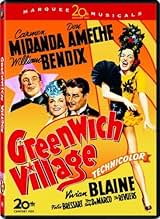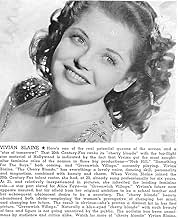Ajouter une intrigue dans votre langueIn 1922, a would-be classical composer gets involved with people putting on a musical revue.In 1922, a would-be classical composer gets involved with people putting on a musical revue.In 1922, a would-be classical composer gets involved with people putting on a musical revue.
Paul Hurst
- Milkman
- (scenes deleted)
Bill Alcorn
- Costume Party Guest
- (uncredited)
Maceo Anderson
- One of the Four Step Brothers
- (uncredited)
Charles Arnt
- Author with Letter
- (uncredited)
Buddy Banks
- Clarinet Player
- (uncredited)
Oliver Blake
- Bigelow - Author
- (uncredited)
Herman Boden
- Chorus Boy
- (uncredited)
Avis en vedette
The film, not surprisingly, is set in Greenwich Village, New York (actually a sound stage at Twentieth Century-Fox) and begins with an eager young composer, Kenneth (Don Ameche), arriving in town--hoping to make it big. Soon, he meets up with Dan (William Bendix) and his friends at Danny's Den--the strangest speakeasy in Hollywood history. At this 'joint', Carmen Miranda and Vivian Blaine perform. After hearing some of Kenneth's music, Danny decides to put on a show to showcase his sweetie. The problem is that this sweetie (Blaine) might just be in love with Kenneth AND some sharpie (Felix Bressart) is interested in having the music performed instead by a big-name director instead of on some stage show in the Village. What's next? See the film....or not.
I am glad I watched this film when I did, as I had just finished watching a GREAT MGM musical, "Anchors Away". Although both films were in color, there weren't too many other similarities. "Anchors Away" had great music, singing, plot--everything. And, by comparison, "Greenwich Village" just looked tired and second-rate...which, is what it was. As for Carmen Miranda, she seemed unnecessary to the film and a bit lost. Additionally, fair tunes and the studio's lesser singers (Alice Faye was out on maternity leave), the film never really hit the mark and is a few steps below the average Fox musical of the period. And, when it was over, I couldn't remember much of anything about it. Adequate and no more.
By the way, I was VERY surprised to see Ernest 'Sunshine Sammy' Morrison in the film dancing and singing a musical number with a number of other black entertainers. While I was VERY familiar with him as a member of Our Gang (since its beginning) and the East Side Kids, I had no idea he was so talented in other ways.
I am glad I watched this film when I did, as I had just finished watching a GREAT MGM musical, "Anchors Away". Although both films were in color, there weren't too many other similarities. "Anchors Away" had great music, singing, plot--everything. And, by comparison, "Greenwich Village" just looked tired and second-rate...which, is what it was. As for Carmen Miranda, she seemed unnecessary to the film and a bit lost. Additionally, fair tunes and the studio's lesser singers (Alice Faye was out on maternity leave), the film never really hit the mark and is a few steps below the average Fox musical of the period. And, when it was over, I couldn't remember much of anything about it. Adequate and no more.
By the way, I was VERY surprised to see Ernest 'Sunshine Sammy' Morrison in the film dancing and singing a musical number with a number of other black entertainers. While I was VERY familiar with him as a member of Our Gang (since its beginning) and the East Side Kids, I had no idea he was so talented in other ways.
If you are looking for some light entertainment with a few pleasant musical numbers, this is the film for you. The story is silly, but Don Ameche is good in his role as the would-be composer. Unfortunately, the ending is abrupt and unbelievable.
Greenwich Village of 1922. The living is easy and the speak-easies are in abundance.
A music instructor, Don Ameche, comes to town to get his concerto played and in the process meets up with Bill Bendix, Carmen Miranda and Vivian Blaine. Bendix is a small time hood with a funny heart who runs a joint. He likes Ameche's music and thinks that he can use it in a show that he is planning. Comically, Bendix thinks that he is in competition with Florenz Ziegfeld.
This movie makes for very light musical fanfare. The songs are great, especially Blaine belting out whispering and Bendix is a riot in a Roman toga dancing and singing around. Miranda, a musical dancing genius, is at the top of her game as well and Blaine sings Whispering with that soft voice.
The film is quite entertaining and a joy to watch.
A music instructor, Don Ameche, comes to town to get his concerto played and in the process meets up with Bill Bendix, Carmen Miranda and Vivian Blaine. Bendix is a small time hood with a funny heart who runs a joint. He likes Ameche's music and thinks that he can use it in a show that he is planning. Comically, Bendix thinks that he is in competition with Florenz Ziegfeld.
This movie makes for very light musical fanfare. The songs are great, especially Blaine belting out whispering and Bendix is a riot in a Roman toga dancing and singing around. Miranda, a musical dancing genius, is at the top of her game as well and Blaine sings Whispering with that soft voice.
The film is quite entertaining and a joy to watch.
It amazes me that other postings about films are so critical of movies intended to be entertaining fluff, for being fluff.
And trite? What movie today isn't a rehash of something already done over and over again?
Musicals of the time weren't intended to be "South Pacific" or "Oklahoma". The plots were devised to be excuses to have music or dance performances or comedy bits. You probably noticed that the plots are mostly "backstage" stories and the characters portrayed are singers or dancers.
Technicolor is always pleasing to the eye, and so are the performances of Vivian Blaine and Carmen Miranda in this film.
So just sit back and enjoy.
And trite? What movie today isn't a rehash of something already done over and over again?
Musicals of the time weren't intended to be "South Pacific" or "Oklahoma". The plots were devised to be excuses to have music or dance performances or comedy bits. You probably noticed that the plots are mostly "backstage" stories and the characters portrayed are singers or dancers.
Technicolor is always pleasing to the eye, and so are the performances of Vivian Blaine and Carmen Miranda in this film.
So just sit back and enjoy.
Let me add my voice to those who say we should not judge this piece of Zanuckfluff with the same standard we'd use for The Bard of Avon or even a Gene Kelly movie. Yes, the story is preposterous, pasted together with no other reason than to showcase the talents of some remarkably talented people, all having a great deal of fun, which I suspect anyone with the slightest nostalgia for the Technicolor movies of the war years will share. William Bendix, an actor vastly underrated, is both funny and touching, and Vivian Blaine and her one day to be fellow cast member from "Guys and Dolls," B.S. Pully, are wonderful. Felix Breshart, wearing the same scarf he wore in "To Be or Not to Be," is lovable as always as the musical con man. This is Greenwich Village as it never was and will never be. Sit back, suspend disbelief, and enjoy yourself. They don't make 'em like this anymore, and I for one regret it.
Le saviez-vous
- AnecdotesThe Revuers (Betty Comden, Adolph Green, Judy Holliday and Alvin Hammer) received billing (as a group), but their one musical number, "The Baroness Bazooka," was cut from the release print. Their remaining roles are little better than extras.
- GaffesThe opening narration on the bus claims that George Gershwin was one of those legendary talents who got his start in Greenwich Village, but in 1922, when this film supposedly takes place, Gershwin was just starting out.
- Citations
Princess Querida O'Toole: Would you like to take advantage of me?
- ConnexionsEdited into Carmen Miranda (1969)
- Bandes originalesI'm Just Wild About Harry
(uncredited)
Music by Eubie Blake
Lyrics by Noble Sissle
Performed by Carmen Miranda
Meilleurs choix
Connectez-vous pour évaluer et surveiller les recommandations personnalisées
Détails
- Durée1 heure 22 minutes
- Rapport de forme
- 1.37 : 1
Contribuer à cette page
Suggérer une modification ou ajouter du contenu manquant

Lacune principale
By what name was Greenwich Village (1944) officially released in India in English?
Répondre






























